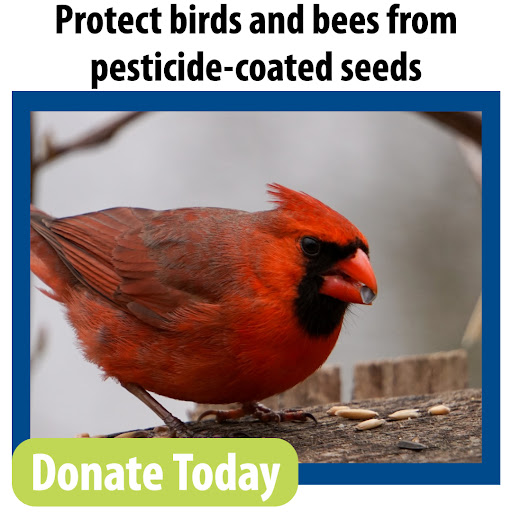

 |
John,
How much pesticide does it take to kill a songbird?
A single seed dipped in neonicotinoids is enough. Farm seeds are often sold coated in this class of pesticides, called neonics for short -- and these pesticides poison bees, too.1
We're working to ban the worst uses of these toxic pesticides, including their use in pre-treating seeds. Are you with us?
This danger isn't merely hypothetical. In 2017, 200 red-winged blackbirds were discovered dead on the ground in rural New Jersey. Other blackbirds survived but appeared dazed and disoriented.
The birds had eaten wheat seeds coated in neonics, which had recently been spread in the area.2
Seed coatings are the most common use of neonics in the United States, but they aren't regulated like pesticides by the Environmental Protection Agency (EPA) because the agency doesn't consider them to be pesticides at all. Pesticides that are directly sprayed, on the other hand, are regulated by the EPA.
This year, 150 million acres of crops -- wheat, soybeans, corn and more -- will be planted with neonic-coated seeds.3 And it's not just birds that will be harmed.
The farm equipment used to plant these seeds can churn up an airborne dust cloud toxic enough to kill a bee caught in its path -- and even make an entire field of flowers unsafe for bees as the dust settles back to the earth.4
We can't let these neonic-coated seeds put birds and bees at risk. Support our campaign to ban the worst uses of neonics with an Earth Day donation today.
Thanks to the support of people like you, our national network is making steady progress to protect birds and bees from toxic pesticides.
- We've already sent nearly 20,000 petition signatures to the EPA, urging it to regulate neonic-coated seeds like any other pesticide.
- We helped win commitments from Lowe's and Home Depot to take neonics off their shelves, and we've sent tens of thousands of messages to Amazon urging it to do the same.
- We also helped win federal protections for bees and other pollinators on 11 million acres of Department of Defense-owned land -- and we're urging the federal government to reinstate a ban on neonics in wildlife refuges.
But all this work is only possible with your support. We've set a goal of raising $100,000 before midnight on April 22 to help save the bees. John, will you donate to our Earth Day 2023 Drive today?
Thank you,
Ellen Montgomery
1. Kimberly A. Stoner, "Best Management Practices for Farmers Using Seeds Treated With Neonicotinoid Insecticides," Connecticut Agricultural Experiment Station, January 1, 2017.
2. "Update: Cumberland County Blackbird Mortality," New Jersey Department of Environmental Protection, January 4, 2017.
3. S.D. Frank and J.F. Tooker, "Neonicotinoids pose undocumented threats to food webs," Proceedings of the National Academy of Sciences (PNAS), September 2, 2020.
4. Kimberly A. Stoner, "Best Management Practices for Farmers Using Seeds Treated With Neonicotinoid Insecticides," Connecticut Agricultural Experiment Station, January 1, 2017.
Your donation will be used to support all of our campaigns to protect the environment, from saving the bees and protecting public lands, to standing up for clean water and fighting climate change. None of our work would be possible without supporters like you. Environment Colorado may transfer up to $50 per dues-paying member per year into the Environment Colorado Small Donor Committee.
Environment Colorado, Inc.
1543 Wazee St., Suite 400, Denver, CO 80202, (303) 573-3871
Member questions or requests call 1-800-401-6511.
Facebook | Twitter
If you want us to stop sending you e-mail then follow this link -- Unsubscribe